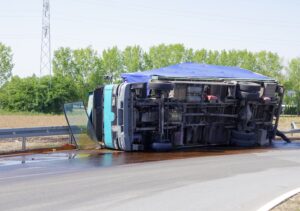Trucking accidents frequently happen when truck drivers behave carelessly or recklessly. In some cases, they may fail to watch the road attentively, while at other times, they may speed, fail to yield the right-of-way, or disregard other standard rules of the road.
Accidents may also happen when trucking companies commit negligent acts. For example, they may fail to properly load or unload cargo onto the trailer or fail to adequately train and supervise their drivers.
If you suffered injuries in a recent collision, a skilled truck accident lawyer can obtain a copy of the police report and investigate how the accident happened. A personal injury attorney experienced in truck accidents may then be able to file a claim or lawsuit on your behalf in pursuit of the compensation you need.
How Do Negligent Truck Drivers Cause Accidents?
Negligent truck drivers can cause accidents in many different ways, often due to carelessness or failure to follow traffic rules. One of the most common ways is by speeding. Large trucks require more time to stop and are harder to control, so when truck drivers speed, they increase the likelihood of losing control of their vehicle, which can lead to serious crashes – especially on highways or in heavy traffic.
Another common form of negligence is distracted driving. Truck drivers may take their eyes off the road to text, use a GPS, eat, or adjust the radio. Even a few seconds of distraction can be enough to cause a collision – especially when driving a large vehicle like a truck. Distracted driving reduces reaction time, making it harder to avoid roadway hazards.
Fatigue is also a major issue among truck drivers. Truckers often drive long distances and may push themselves to stay awake when they are tired. Fatigue can severely affect a driver’s ability to concentrate, make decisions, and react quickly. In the worst cases, a truck driver may even fall asleep at the wheel, which can result in devastating accidents.
Another way truck drivers cause accidents is by failing to check their blind spots. Trucks have large blind spots on all sides, particularly on the right side and directly behind the trailer. If truck drivers do not carefully check these areas before changing lanes or making a turn, they can easily hit a car that they did not see.
Impaired driving is another form of negligence that leads to serious accidents. If a truck driver is under the influence of alcohol or drugs, their ability to drive safely is significantly reduced. Impaired drivers are more likely to make poor decisions, react slowly, or drift out of their lane, putting everyone on the road at risk.
Finally, failing to follow basic traffic laws, like running red lights, failing to yield, or following too closely, are other ways negligent truck drivers can cause crashes. Trucks require more distance to stop, so tailgating or not leaving enough space between vehicles can result in rear-end collisions.
How Do Negligent Trucking Companies Cause Accidents?

Negligent trucking companies can cause accidents in several ways, often by failing to follow regulations or cutting corners to save money.
- One of the most common ways is through improper maintenance of their trucks. Commercial trucks are large, complex vehicles that require regular inspections and upkeep. If a company neglects to perform routine maintenance – such as checking brakes, tires, and engine components – the truck becomes unsafe to operate. For example, worn-out brakes can fail to stop a truck in time, causing a serious accident. Similarly, poorly maintained tires can blow out, leading to a loss of control.
- Another way trucking companies contribute to accidents is by overloading their trucks or improperly securing cargo. Every truck has a weight limit that it should not exceed. Overloading trucks puts extra strain on the vehicle, making it harder to stop or control. Overloaded trucks are also more likely to roll over, especially in sharp turns or during sudden maneuvers. In addition, improperly secured cargo can shift during transport, causing the truck to become unbalanced or lose its load onto the road, leading to crashes.
- Negligent hiring practices are another significant issue. Trucking companies are responsible for hiring qualified drivers with valid commercial driver’s licenses (CDLs) and clean driving records. Failing to properly screen applicants or hiring drivers without the necessary skills increases the risk of collisions. Trucking companies may also fail to provide adequate training. Driving a commercial truck is much different from driving a regular car, and drivers need specialized training to operate their vehicles safely. Companies that skip this training process put both their drivers and others on the road in danger.
- Furthermore, some trucking companies pressure their drivers to meet unrealistic deadlines, which encourages drivers to speed or drive longer hours than legally allowed, thereby increasing the chance of fatigue-related accidents. Although these behaviors involve the drivers directly, the company is at fault for creating an unsafe working environment.
- Finally, failing to comply with federal regulations is a major form of trucking company negligence. The Federal Motor Carrier Safety Administration (FMCSA) sets rules for truck maintenance, driver hours, and safety standards. When companies ignore these regulations, they put everyone on the road at risk.
A seasoned truck accident attorney will be able to investigate your accident and show negligence on the part of the trucking company, if warranted.
Injuries in Trucking Accidents
Victims of trucking collisions often suffer from severe physical and mental injuries due to the sheer size and weight of commercial trucks. Physically, some of the most common injuries include broken bones, head injuries, spinal cord injuries, and internal injuries.

- Broken bones occur frequently in truck accidents because of the force of the collision. Victims may experience fractures in their arms, legs, ribs, or other parts of the body. Depending on the severity, broken bones may require surgery, long-term rehabilitation, and physical therapy to heal properly.
- Head injuries, including concussions and traumatic brain injuries (TBIs), are also common. These injuries occur when a person’s head hits a hard surface during the crash or experiences rapid movement that causes the brain to strike the inside of the skull. TBIs can have lasting effects on a person’s memory, thinking, and coordination, sometimes leading to lifelong challenges.
- Spinal cord injuries are another serious consequence of trucking accidents. The force of a truck collision can damage the spinal cord, potentially causing partial or complete paralysis. Victims may lose movement and sensation in their limbs, and in severe cases, spinal cord injuries can be permanent, requiring long-term medical care.
- Internal injuries, such as damage to organs or internal bleeding, can occur when the body is struck or compressed during an accident. These injuries are not always immediately apparent and may require emergency surgery to address.
- In addition to physical injuries, victims of truck crashes often suffer from mental and emotional trauma. Post-traumatic stress disorder (PTSD) is common, especially if the accident is severe or life-threatening. People with PTSD may experience flashbacks, nightmares, anxiety, and depression. They may also avoid driving or feel intense fear when near large trucks.
- Depression and anxiety can also develop following a truck accident, especially if the injuries cause long-term physical disabilities or financial stress. Victims may feel overwhelmed by medical bills, loss of work, or the inability to return to their previous lifestyle.
In many cases, the combination of physical pain and emotional distress can take a significant toll on a person’s overall well-being. Both physical and mental injuries may require extensive treatment, including surgeries, therapy, and counseling, to help victims recover and regain a sense of normalcy following a trucking accident.
Proving Negligence in a Truck Accident Case

To prove negligence in a truck accident case, the injured party must demonstrate four key elements: duty of care, breach of duty, causation, and damages. These elements help show that the truck driver or trucking company was responsible for the accident.
- The first element is a duty of care, which means that the truck driver or trucking company has a responsibility to act in a way that ensures the safety of others on the road. All drivers, including truck drivers, have a duty to follow traffic laws and drive safely. Similarly, trucking companies have a duty to ensure their vehicles are well-maintained, follow federal regulations, and hire qualified drivers. In a truck accident case, you must first establish that the truck driver or company owed you this duty of care.
- The second element is a breach of duty. Breach of duty occurs when the truck driver or company fails to meet the expected standard of care. For example, if a truck driver was speeding, driving while distracted, or under the influence of alcohol, they would have breached their duty to drive safely. In cases involving trucking companies, a breach can occur if they fail to properly maintain the truck or hire an unqualified driver. To prove a breach of duty, evidence such as police reports, eyewitness testimony, or surveillance footage can be used to show the truck driver or company acted negligently.
- The third element is causation, which means proving that the breach of duty directly caused the accident and your injuries. This step is important because the defendant (the truck driver or company) may argue that something else caused the accident, such as your own actions or road conditions. To prove causation, you need to show that the truck driver’s or company’s negligence was the primary reason for the crash. Evidence like accident reconstruction reports, expert testimony, and medical records can help establish this link.
- The final element is damages, which involves showing that you suffered actual harm or losses because of the accident. Damages can include physical injuries, medical bills, lost income, and emotional pain and suffering. To prove damages, you can provide medical records, bills, and testimony from doctors or mental health professionals to document the extent of your injuries.
Common Compensable Losses in a Truck Accident Claim or Lawsuit

If you suffered an injury in a truck accident due to a negligent truck driver or trucking company, you may be entitled to compensation for several different kinds of losses through a claim or lawsuit. These compensations are meant to cover the financial, physical, and emotional losses you suffer as a result of the accident. They generally fall into two main categories: economic and non-economic damages.
Economic Damages
Economic damages are the financial losses that you experience as a direct result of the truck accident. These damages are typically easier to calculate because they come with clear, measurable costs.
- Medical Expenses – These expenses are one of the most common damages. It covers the cost of any medical care you need as a result of the crash, such as hospital stays, surgeries, doctor visits, physical therapy, medication, and medical devices like wheelchairs or braces. You can also recover future medical expenses if your injuries require long-term treatment or rehabilitation.
- Lost income – If your injuries prevent you from working, you can seek compensation for the earnings you have lost during your recovery period. If your injuries are severe enough to affect your ability to work in the future, you can also pursue compensation for lost earning capacity, which covers the income you will lose because you can no longer do the same job or work the same hours.
- Property Damage – If your vehicle or any other property was damaged in a truck accident, you can recover the cost of repairs or the value of replacing the damaged property.
Non-economic Damages
Non-economic damages are intended to compensate you for losses that do not have a specific dollar value. These damages are more subjective but can be just as important as economic damages.
- Pain and Suffering – This compensation is for the physical pain and discomfort you experienced due to your injuries. It also includes compensation for any chronic pain you may suffer in the future.
- Emotional Distress – Truck crashes can cause significant emotional trauma, including anxiety, depression, or PTSD. You can recover compensation for the emotional toll the accident has taken on your mental health.
- Loss of Enjoyment of Life – If your injuries prevent you from enjoying activities you once loved or affect your overall quality of life, you can seek compensation for this loss.
In some cases, punitive damages may also be awarded if the truck driver or trucking company’s behavior was especially reckless or dangerous.
Contact an Experienced Truck Accident Lawyer Today

If you recently suffered injuries in a collision that resulted from a truck driver or trucking company’s negligence, an experienced truck accident attorney can help you throughout the process. Your personal injury lawyer will swiftly investigate the circumstances surrounding your accident, go over your legal options with you, and pursue the justice and compensation you deserve for your losses.
 Truck Accident
Truck Accident
 Motorcycle Accidents
Motorcycle Accidents
 Wrongful Death
Wrongful Death
 Car Accident
Car Accident







